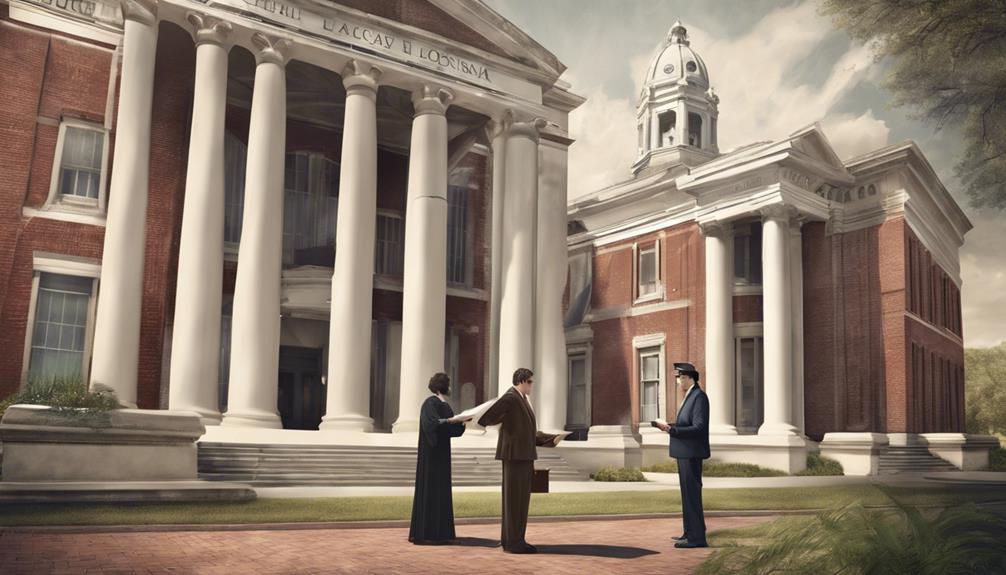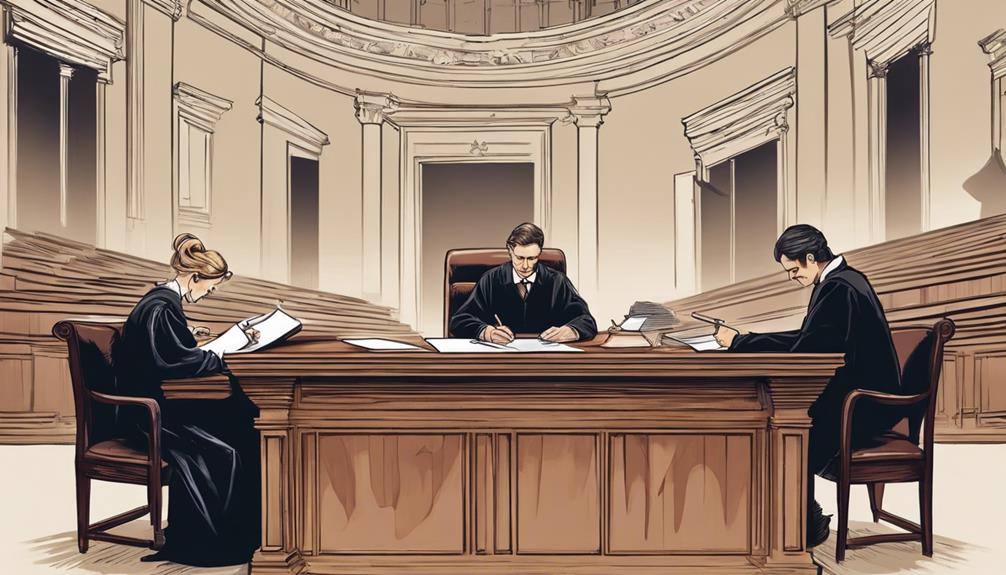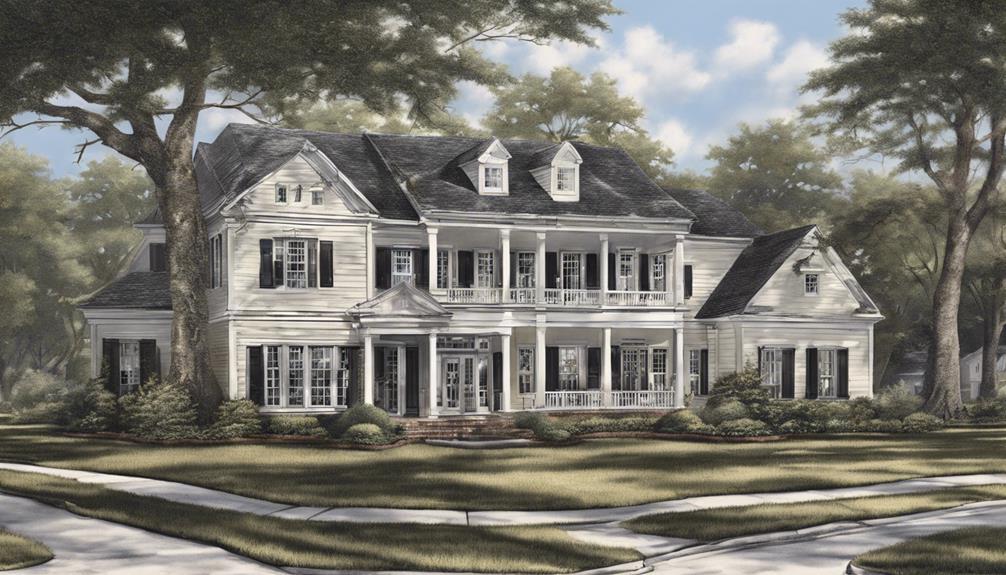Exploring the intricacies of navigating a divorce in Louisiana, it’s difficult to ignore the complications that arise during the dissolution of a marriage.
The journey of untangling marital bonds involves a series of crucial steps that demand careful consideration and understanding.
As we embark on this exploration, we aim to shed light on the nuanced processes and essential knowledge required to navigate the legal landscape of divorce in Louisiana.
Let's uncover the key insights that can empower individuals facing this significant life transition.
Key Takeaways
- Understand residency and grounds for divorce in Louisiana.
- Differentiate between fault-based and no-fault divorce options.
- Comply with waiting periods based on circumstances.
- Seek legal guidance for proper filing and settlement agreements.
Eligibility to File for Divorce
To determine eligibility to file for divorce in Louisiana, we must first understand the domicile requirement that mandates residency in the state for at least one spouse.
In Louisiana, the law stipulates that the divorce petition must be filed in the Judicial District Court of the parish where either spouse is domiciled. This requirement ensures that the legal proceedings take place in the appropriate jurisdiction.
Whether pursuing a fault-based divorce or a no-fault divorce, meeting the eligibility criteria is crucial for initiating the process. Understanding the grounds for divorce in Louisiana is essential as it directly impacts the eligibility to file based on fault or no-fault reasons.
Domicile requirements play a pivotal role in establishing who can file a divorce petition in Louisiana. By meeting these criteria, individuals can move forward with the divorce process knowing they've fulfilled the necessary prerequisites set forth by Louisiana law.
Grounds for Divorce in Louisiana

Navigating the process of divorce in Louisiana involves understanding the grounds upon which a marriage can be legally dissolved, whether based on fault or no-fault reasons. In Louisiana, divorce can be granted based on a variety of grounds, including:
- Fault-based grounds: These include adultery, felony conviction, and imprisonment.
- No-fault grounds: To file for divorce under no-fault grounds in Louisiana, spouses must live separate and apart for a specified period.
- Covenant Marriage: Louisiana recognizes Covenant Marriages, which have limited grounds for divorce, focusing primarily on fault-based reasons.
When pursuing a divorce in Louisiana, it's essential to be aware of the specific grounds under which you're filing. Depending on whether you're seeking an Article 102 or Article 103 divorce, proof of these grounds may be required.
Understanding the grounds for divorce is crucial as it forms the foundation of your legal proceedings and can impact the outcome of the divorce process.
Understanding Article 102 and Article 103
Understanding the distinctions between Article 102 and Article 103 divorces in Louisiana is crucial for making informed decisions throughout the divorce process.
Article 102 divorce, a no-fault option, necessitates a waiting period of either 180 days if there are no minor children or 365 days if minor children are involved before filing for divorce.
On the other hand, Article 103 divorce allows for an immediate dissolution of marriage on fault-based grounds like adultery, felony conviction, or abuse without any waiting period.
When navigating Louisiana's divorce laws, it's important to consider whether a fault-based divorce under Article 103 or a no-fault option under Article 102 is more suitable based on individual circumstances.
Understanding the implications of these two options can help spouses choose the most appropriate path forward, considering factors such as the presence of minor children, the desire for a quicker resolution, and the specific grounds for divorce.
Covenant Marriage Considerations

As we explore Covenant Marriage Considerations in Louisiana, it becomes evident that this unique marital arrangement imposes specific requirements and limitations on couples seeking to dissolve their union. Covenant marriages in Louisiana come with strict requirements and limited reasons for divorce, making the process more challenging than in traditional marriages.
Here are some key considerations:
- Premarital Counseling: Couples entering a covenant marriage in Louisiana are required to undergo premarital counseling, emphasizing the seriousness of the commitment they're making.
- Grounds for divorce: The grounds for divorce in a covenant marriage are limited and include specific reasons such as adultery, abuse, felony conviction, and living separately for a specified period.
- Longer Separation Period: Louisiana law mandates a longer separation period for covenant marriage divorce compared to regular divorces, adding to the complexity of the process.
Navigating a covenant marriage dissolution involves understanding these stringent requirements and being prepared for the challenges that may arise during divorce proceedings, especially when citing grounds like adultery.
Filing for Divorce Procedures
When filing for divorce in Louisiana, ensuring all required forms are accurately completed is vital to a smooth process. The court filing process can be complex, so attention to detail is essential.
Required Forms for Filing
To initiate the divorce process in Louisiana, completing the required forms, including the Petition for Divorce and any case-specific documents, is essential for legal compliance and proper filing with the court in the domiciled parish of either spouse. When filing for divorce, it's crucial to ensure all necessary paperwork is accurately filled out to avoid delays or complications.
- Petition for divorce: The primary document to initiate the divorce proceedings.
- Case-Specific Forms: Additional forms tailored to your unique situation may be required.
- Marital Settlement Agreement: If agreements on property division and child arrangements exist, this document may be necessary.
Seeking guidance from a legal professional can help navigate the complexities of filing for divorce in Louisiana efficiently.
Court Filing Process
Navigating the court filing process for divorce in Louisiana involves submitting the necessary forms at the parish courthouse where either spouse resides. Proper filing location is crucial to ensure compliance with Louisiana State laws. Filing for divorce necessitates following specific court procedures and residency requirements. Seeking legal advice, especially in cases involving covenant marriages or legal separation, can be invaluable during this process. It's essential to accurately complete and file the Petition for Divorce and Service form to initiate the proceedings smoothly. Here is a breakdown of key elements involved in the court filing process:
| Key Elements | Description | Importance |
|---|---|---|
| Child support | Financial support for children | Ensures children's well-being |
| Filing Location | Parish courthouse | Critical for legality |
| Legal Assistance | Guidance from an attorney | Ensures proper filing |
Serving Divorce Papers

Serving divorce papers to your spouse is a critical step in the legal process of divorce in Louisiana. It's essential to ensure that the proper procedures are followed to notify your spouse of the legal action being taken.
Here are some key points to consider:
- Authorized Person: An authorized individual must serve the divorce papers to your spouse.
- Certified Mail: Alternatively, divorce papers can be sent through certified mail with return receipt requested.
- Legal Requirement: Serving divorce papers is a legal requirement to inform your spouse about the divorce proceedings.
Properly serving the divorce papers is crucial to avoid delays in the divorce process and prevent potential legal complications. By adhering to the specific rules and guidelines for serving divorce papers, you can help ensure that the process is valid and legally binding. Your attention to detail in this step will contribute to a smoother divorce process for both parties involved.
Contested Vs. Uncontested Divorce

When deciding between contested and uncontested divorce, understanding the legal process differences and spousal agreement options is crucial.
In an uncontested divorce, both parties reach agreements independently, while a contested divorce involves unresolved disagreements that may need court intervention.
Knowing these distinctions can significantly impact the divorce process and the final outcomes for all parties involved.
Legal Process Differences
In Louisiana, the legal process for divorce varies significantly depending on whether it's contested or uncontested.
- Uncontested Divorce: Both spouses agree on key issues like property division, child custody, and support without court intervention.
- Contested Divorce: Spouses can't agree, leading to court involvement for resolution.
Key Differences: Uncontested divorces typically proceed faster and cost less, while contested divorces may involve mediation, negotiation, or trial for resolution.
Deciding between a contested or uncontested divorce hinges on the level of conflict and willingness to cooperate between spouses. Understanding these distinctions is crucial when considering how to proceed with filing for a divorce in Louisiana.
Spousal Agreement Options
Navigating the complexities of spousal agreements in divorce proceedings, whether contested or uncontested, requires a thoughtful approach to ensure both parties' needs and interests are addressed effectively. In an uncontested divorce, both spouses agree on important aspects like property division and child custody, leading to a quicker and more cost-effective process. On the other hand, a contested divorce arises when disagreements exist, potentially involving court hearings, legal representation, and prolonged proceedings. The choice between contested and uncontested divorce hinges on the level of cooperation between spouses and the intricacies of their situation. Here is a comparative table to highlight the key differences:
| Aspect | Uncontested Divorce | |
|---|---|---|
| Process Speed | Generally quicker | Potentially lengthy |
| Cost | Less expensive | More costly |
| Cooperation Needed | High cooperation required | Often involves disputes |
| Legal Representation | Minimal legal representation may be sufficient | Legal representation usually necessary |
Waiting Period Requirements

Upon embarking on the journey of divorce in Louisiana, one crucial aspect to consider is the waiting period requirements, which serve as a pivotal stage in the process. Understanding the nuances of the waiting period is essential for navigating the complexities of divorce proceedings in Louisiana.
Here are some key points to keep in mind:
- For a no-fault divorce (Article 102) in Louisiana, a waiting period of 180 days of living separately is mandatory before filing.
- In contrast, a fault-based divorce (Article 103) in Louisiana doesn't require a waiting period before filing, allowing for quicker resolution in certain cases.
- In the case of a covenant marriage in Louisiana, couples must endure a waiting period of 2 years of separation before being eligible to file for divorce.
The waiting period not only fulfills legal requirements but also provides couples with a period of reflection and the opportunity for potential reconciliation. This introspective time can be crucial for making informed decisions about the future and the next steps in the divorce process.
Legal Assistance for Divorce

Transitioning from understanding the waiting period requirements in Louisiana divorce proceedings, seeking legal assistance for divorce becomes a crucial step in ensuring a smooth and informed progression through the legal process. Family law attorneys specializing in divorce cases can provide invaluable guidance on crucial decisions such as choosing between Article 102 or Article 103 divorce based on individual circumstances. These legal experts ensure that the correct paperwork is filed with the court, protecting your rights throughout the divorce proceedings. Crafting a solid settlement agreement that safeguards your interests is facilitated by the expertise of a knowledgeable divorce attorney. For those facing financial constraints, Louisiana offers free or reduced-fee legal aid services to assist individuals in navigating the complexities of divorce proceedings. By enlisting the help of experienced professionals in family law, you can rest assured that your rights are protected and your divorce process is handled with care and expertise.
| Legal Assistance Services | Benefits | Availability |
|---|---|---|
| Family Law Attorneys | Expert guidance on divorce decisions | Widely available |
| Free Legal Aid Services | Financial assistance for legal support | Based on eligibility |
| Rights Protection | Safeguarding interests throughout process | Essential in cases |
Marital Property Division in Louisiana

When addressing marital property division in Louisiana, it's essential to understand the application of community property laws and how assets are typically divided in a divorce. In Louisiana:
- Marital property, which includes assets acquired during the marriage like income, real estate, and personal property, is subject to equal division.
- Separate property, such as assets owned before marriage or received as gifts/inheritance, is generally not divided during divorce proceedings.
- Courts have the discretion to divide marital debts and assets equitably if an equal division isn't feasible, ensuring a fair distribution.
Throughout the property division process, Louisiana Child Support Guidelines play a crucial role in determining child support obligations. Understanding the nuances of community property, separate property, and the division of assets and debts is vital to navigating the property division process effectively.
Frequently Asked Questions
Do I Need a Lawyer to File for Divorce in Louisiana?
We don't need a lawyer to file for divorce in Louisiana, but it's wise to consider seeking legal advice. While self-representation is allowed, a lawyer can offer valuable guidance on navigating complex legal processes.
What Is the Difference Between a 102 and 103 Divorce in Louisiana?
The main difference between a 102 and 103 divorce in Louisiana lies in the waiting period. A 102 divorce requires 180 days of living separate and apart, while a 103 divorce allows for immediate dissolution if fault grounds like adultery are present.
What Are Grounds for Immediate Divorce in Louisiana?
Immediate grounds for divorce in Louisiana include adultery, felony conviction, and domestic violence. These situations can lead to quick proceedings without a waiting period. Legal advice is crucial to gather evidence effectively for such cases.
What Is the Wife Entitled to in a Divorce in Louisiana?
In Louisiana, the wife is entitled to an equitable distribution of assets acquired during the marriage, potential spousal support based on factors like financial need and duration of marriage, division of retirement benefits, and rights to marital property.
Conclusion
In conclusion, navigating the divorce process in Louisiana can be complex and emotional, but with the right information and support, individuals can make informed decisions and move forward with confidence.
Understanding the eligibility requirements, grounds for divorce, and legal procedures is crucial in ensuring a smooth transition.
By seeking legal assistance and being prepared for the challenges ahead, individuals can effectively navigate the process and find resolution in their divorce proceedings.










